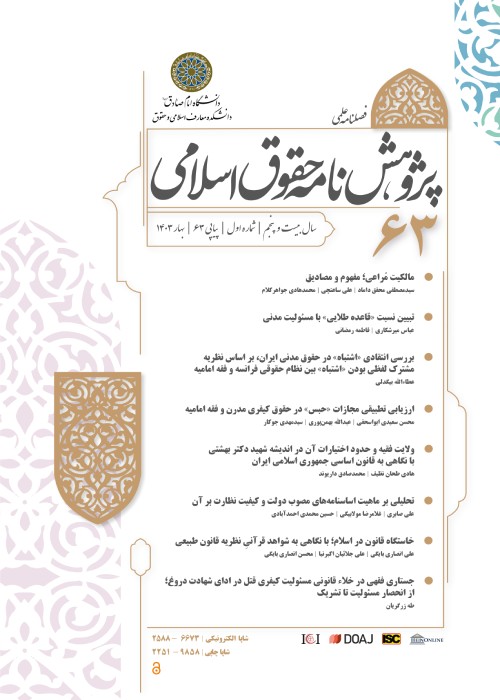The Canonic Oversight Procedure of Laws and Regulations by the Jurists of the Guardian Council: From Procedural Analysis to a Proposed Model
The Iranian legal landscape is intricately interwined with Islamic principles, notably enshrined in article 4 of the Iranian Constitution, which requires all laws and regulations to conform to Islamic standards. The core of this constitutional framework is the concept of Sharia supervision [Nezarat-e-Sharei] exercised by the jurists of the Guardian Council. This paper tries to focus on the crucial issue of the procedural mechanisms and protocols guiding the Sharia supervision of legal norms, including the constitution, ordinary laws, and regulations.
Research Question:
Considering the emphasis of the constitutionon Sharia-based legal norms, this study addresses this basic question: "What procedural arrangements define and illustrate the Sharia supervisory process undertaken by the jurists of the Guardian Council, as mandated by article 4 of the Iranian Constitution?"
Research Hypothesis:
The lack of explicit procedural details in article 4 prompts the hypothesis that there is a need for a more comprehensive framework and protocols for the implementation of Sharia supervision. The evolving legal landscape in Iran, along with the endorsement of overarching legislative policies by the leadership, underscores the importance of formalizing procedural aspects to ensure compliance with Islamic principles.
Methodology & Framework, if Applicable:
This research employs a meticulous approach, using extensive library sources and analyzing the ongoing procedures of the Guardian Council's jurists. In response to the primary question of the research, this paper examines the Sharia supervision mechanisms applied by these jurists regarding various legal norms, spanning the Constitution, pre-revolutionary laws, and post-revolutionary enactments.
In order to evaluate the Sharia legality of enactments, this research examines the criteria for judicial proceedings and the timeframe within which Sharia opinions are issued. The focal point is the identification of the authority responsible for declaring non-compliance with Sharia standards and elucidating the primary audience for these opinions, particularly with regard to regulations.
Due to lack of comprehensive studies on the procedural aspects of Sharia supervision, this research tries to contribute a nuanced understanding of the jurists' approach to monitoring legal norms. The innovative aspect lies in the analytical critique and positive suggestions offered for the procedural aspects of Sharia supervision under article 4.
The article concludes by examining how Sharia’s opinions have been historically applied to diverse legal norms and provides a detailed review of the procedures and practices of Sharia supervision on laws and regulations. This comprehensive analysis aims to fill the gap in the existing literature, offering valuable insights into the evolving dynamics of Sharia supervision within the Iranian legal system. The findings hold significance not only for scholars and legal practitioners interested in Iranian law but also for a broader international audience seeking to comprehend the intricate relationship between Islamic principles and legal governance in Iran.
The findings of the research shed light on the multifaceted procedures employed by the jurists of the Guardian Council in Sharia supervision. Sharia supervision primarily targets legal norms that are perceived as conflicting with Islamic principles, with mechanisms triggered either through self-initiated reviews or in response to specific petitions. Notably, the authority of the jurists is contingent on the submission of a formal request indicating the violation of Sharia principles.
To increase legal security, this study proposes the establishment of specific time frames for Sharia supervision. Depending on the type of legal norm under review, this timeframe initiates either from the issuance of an inspection request or the approval of the norm, with permissible extensions, up to a maximum of five months. This nuanced approach aims to bring clarity and efficiency to the Sharia supervision process, ensuring a structured and accountable application.
This research also unveils the dichotomy between self-initiated reviews and reviews prompted by specific petitions. Self-initiated reviews, while contributing to proactive Sharia supervision, demand a strategic balance to prevent an overwhelming caseload for the jurists. Meanwhile, reviews prompted by petitions introduce an element of public engagement, allowing citizens to actively participate in upholding Islamic principles within the legal framework.
An integral aspect of the discussion revolves around the capacity of the jurists to address diverse legal norms. This study discerns that Sharia supervision is not limited quantitatively; however, it is subject to certain constraints. The possibility of review and the potential for reconsideration and modification are inherent in the Sharia supervision process. This adaptability ensures the ongoing relevance of Sharia supervision in the face of evolving legal dynamics.
In conclusion, this research unravels the complexities of Sharia supervision within the Iranian legal system, offering insights into the procedural arrangements necessary for the effective implementation of article 4 of the Iranian Constitution. By examining the ongoing practices of the Guardian Council's jurists, the study not only contributes to a deeper understanding of the Iranian legal landscape but also proposes enhancements aligning Sharia supervision practices with broader legislative policies.
The proposed refinements aim to foster transparency and reinforce the principles of Islamic governance within the Iranian legal system. The establishment of specific time frames for Sharia supervision represents a significant stride towards a more structured and accountable approach.
- حق عضویت دریافتی صرف حمایت از نشریات عضو و نگهداری، تکمیل و توسعه مگیران میشود.
- پرداخت حق اشتراک و دانلود مقالات اجازه بازنشر آن در سایر رسانههای چاپی و دیجیتال را به کاربر نمیدهد.


